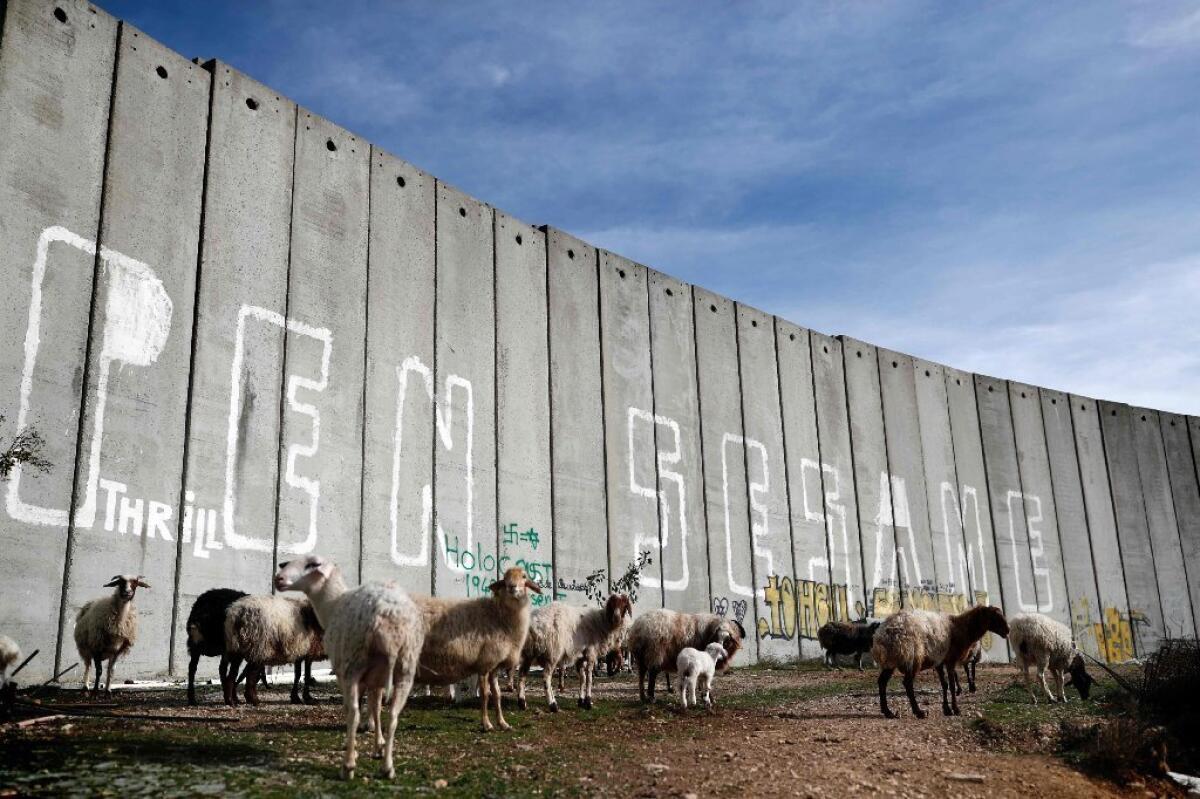Trump says walls work: âJust ask Israelâ

Reporting from Washington â When President Trump vows to build a âbig, beautiful wallâ on the U.S. border with Mexico, he apparently doesnât have the Berlin Wall or the Great Wall of China in mind.
âDo walls work?â Trump said Wednesday. âJust ask Israel about walls.... Just ask Israel.â
With noticeable frequency, Trump appears to be borrowing from Israelâs security manual â including its construction of what Israel calls a security barrier along more than 400 miles of Israelâs border with the West Bank.
Palestinians call it an apartheid wall that in many cases divides Palestinian villages.
Israel has also built walls and fences along its southern border with the Egyptian Sinai desert, a virtual no manâs land of violence and criminal activity.
Trump has suggested other controversial tactics that Israel has embraced in its effort to curtail terrorism.
During the presidential campaign, Trump spoke of âgoing afterâ the families of terrorists and demolishing their homes.
Israel has routinely destroyed the homes of Palestinian suicide bombers or other violent individuals, and often jailed their relatives.
Trump has made a point of declaring war on radical Islam, mincing no words in using the religious label. Ditto for Israel.
But the most concrete policy alignment is his proposed wall along the 2,000-mile border with Mexico.
âThe wall is getting designed right now,â Trump said at a conference of police chiefs Wednesday in Washington. âAnd it will be a real wall.â
âA lot of people say, âOh, oh, Trump was only kidding with the wall.â I wasnât kidding. I donât kid. I donât kid,â he added.
On Tuesday, the new secretary of Homeland Security, John F. Kelly, told Congress that construction of the wall could take two years and cost billions of dollars.
It will not be possible, Kelly said, to âbuild a wall everywhere all at once.â
Fences and walls already line about 600 miles of the border. Whether more walls will make a difference is unclear; illegal immigration has been declining for years primarily for economic reasons.
Trump has insisted that Mexico would pay for the wall, and Mexico has repeatedly said it wonât. That tiff led Mexican President Enrique PeĂąa Nieto to cancel a planned visit to Washington last month to meet with Trump.
On Wednesday, Mexican Foreign Secretary Luis Videgaray called on U.S. Secretary of State Rex Tillerson and Kelly in hopes of improving relations. Trumpâs son-in-law, Jared Kushner, attended the State Department meeting.
Videgaray told reporters that PeĂąa Nieto had not rescheduled his trip to Washington. But the Mexican diplomat said that he and Tillerson would launch a series of working meetings and that Tillerson will visit Mexico City in coming weeks.
Trumpâs invocation of Israelâs counter-terrorist policies has sparked growing concern by security experts and human rights groups.
Terrorist attacks in Jerusalem and in Israel have ebbed since construction of the wall began in 2000. It is now a little more than half complete.
But the decline in violence had multiple causes. Palestinian security forces now work more closely, if secretly, with Israeli security forces, and Palestinian intifadas, or uprisings, tend to have their own dynamic.
Moreover, the wall has inflamed tension and resentment among Palestinians. The barrier and a series of crowded checkpoints have added hours to the daily commutes for thousands of Palestinians who live in the West Bank and travel to work on the Israeli side.
A report this month by the Republican leadership of the Senate Committee on Homeland Security praised Israelâs security efforts in glowing terms.
The report, âSecuring Israel: Lessons Learned from a Nation Under Constant Threat of Attack,â credits Israelâs extensive building of fences and walls along its internal and external borders for the decline in terrorist attacks.
âIsraelâs swift and effective border security measures provide lessons for the United States and other countries seeking to protect their citizens,â says the report, which came out of a trip to Israel by the committee chairman, Sen. Ron Johnson (R-Wis.).
âIsraeli fences have proven more effective than the fencing in the United States and, in regards to the fencing along its border with Egypt, was constructed at a significantly cheaper cost,â it contends.
Israeli security experts say the barrier is not the same as the wall Trump has proposed. For one, Israel is trying to keep out terrorists, and Trump says his wall would primarily aim to stop illegal immigration.
âThe analogy is somewhat limited,â said Susie Gelman, chair of the Israel Policy Forum, a liberal U.S.-based advocacy group that focuses on Israel. âAny security barrier in Israel is effective because it is part of many layers of the security apparatus.â
Israeli Prime Minister Benjamin Netanyahu, who has welcomed Trumpâs election and recently announced the construction of more than 5,000 units in Jewish settlements in the Palestinian West Bank, arrives in Washington next week. He will meet with Trump on Wednesday.
This week, the Israeli Knesset, or parliament, passed a law that would allow Israeli settlers to retroactively legalize homes they built on private Palestinian land.
The law was condemned by the United Nations and much of Europe. The Trump administration has not spoken on the issue, although it previously said that expanding current settlements may be an obstacle to peace.
Times staff writer Brian Bennett contributed to this report.
For more on international affairs, follow @TracyKWilkinson on Twitter
More to Read
Sign up for Essential California
The most important California stories and recommendations in your inbox every morning.
You may occasionally receive promotional content from the Los Angeles Times.











